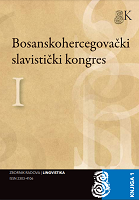Načini izražavanja imperativnosti
Means of Expressing Directives
Author(s): Ivo Pranjković, Lada BadurinaSubject(s): Morphology, Lexis, South Slavic Languages
Published by: Slavistički komitet BiH
Keywords: category of directives; imperative; speech act; category of the second person; performative verbs;
Summary/Abstract: The introductory part of the paper discusses the nature of the category of directives which is directly related to speech acts and, along with vocative structures, questions, exclamations, some particles, etc., belongs to the so called categories of the second person. This is why the form of directive itself is not a manner in the strict sense. Still, the basis of this form is the will of the speaker that a certain action should be performed, and therefore it is closely related to the category of modality and in particular to the so-called subjective modality. The central part of the paper focuses on the means of expressing directive meanings in the Croatian language. It is established, among other things, that directives are expressed through various forms of imperatives (which are the primary, that is, prototypical, form of grammaticising the category of directives), infinitive (e.g. Ne pisati prije nego što svi prepišu zadatke), first future (e.g. Otići ćete u knjižnicu i pretplatiti se), da + present (e.g. Da to odmah vratiš) or da + perfect structure (e.g. Da si to odmah vratio), directive particles and/or defective verbs, e.g. nemoj, hajde, dede(r), neka (special emphasis is placed on “particle forms” of the type hajde, hajdemo, etc., “imperativised” forms of the verbs ići or dati, etc.) and finally through various types of directive structures that have been reduced to a greater or lesser degree, e.g. Svi u učionicu!, Sendvič sa šunkom!, Ni riječi!, Tišina!, Tiho!, Tiše!, Brže!, Dalje!, Nazad!, U pomoć!, Svom snagom naprijed!, Bez dogovaranja!, Do kraja!, Još!, Sada!, Gotovo!, Ho-ruk!, Marš!, Stop!, Iš!, Pst!, etc. Since the category of directives is closely related to speech acts it will also be presented from the aspect of the theory of speech acts. Thus, special attention will be given to the so-called performative verbs (e.g. dopuštati, zabranjivati, zahtijevati, naređivati, određivati, moliti, tražiti, pozivati, predlagati, etc.), which lexicalise the category of directives without expressing an explicit directive meaning in the predicate. This is especially obvious in those structures in which such verbs are used in first person, e.g. Zahtijevam da se raziđete, Ne dopuštamo da se puši, etc.
Journal: Bosanskohercegovački slavistički kongres
- Issue Year: I/2012
- Issue No: 1
- Page Range: 619-628
- Page Count: 10
- Language: Croatian

